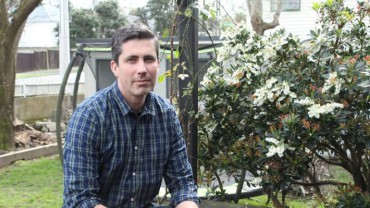Auckland 44yo fitted with pacemaker due to rare disease now fighting for others

A 44-year-old man had to be fitted with a pacemaker after he collapsed while making coffee for his wife.
It’s pushed him to further fight for treatment to be funded in New Zealand for rare diseases like the one he lives with.
Aucklander James McGoram and 11 of his family members – including his mother and two brothers – were diagnosed with Fabry disease about 10 years ago.
The disease, which affects about 40 people in New Zealand, results from the build-up of a type of fat in the body's cells, according to Rare Disorders NZ.
It can cause potentially life-threatening complications, such as progressive kidney damage, heart attacks and strokes.
One morning in July 2019, McGoram, who lives in Avondale, was making coffee for himself and his wife in the kitchen when he blacked out.
He woke shortly after on the kitchen floor before moving himself into a chair, where he blacked out again.
McGoram spent the next two weeks in hospital waiting to be fitted with a pacemaker in case his heart gave out again.
Since learning of his disease, McGoram said it was not a matter of “if, but when” his disease would deteriorate.
With no specific treatment for Fabry disease available in New Zealand, he is only able to manage the symptoms that come with the disease.
As well as now having the pacemaker, McGoram takes medication to control any heart arrhythmia.
Enzyme Replacement Therapy (ERT), a treatment that can halt the progress of Fabry disease by replacing faulty or missing enzymes, is used in about 30 countries worldwide.
But while it is available to McGoram's brothers in Australia, he cannot access it in New Zealand.
While in hospital, McGoram decided to push harder for treatments to be made available for not just his disease, but all rare diseases.
Six months ago, he was accepted onto the board of trustees for Rare Disorders NZ, and he is campaigning for New Zealand’s health system to look at better ways of dealing with rare disorders.
The way Pharmac is currently structured makes it so medications like the one he needs will never be funded, McGoram said.
“You can’t use the same criteria that you would for a vaccine for Covid.”
Lisa Williams, Pharmac’s director of operations, said an application for medicine for ERT was declined in February 2019 because of low quality evidence of long-term health benefits.
“Pharmac has determined that, at this time, we will focus on progressing medicine funding options that are ranked higher,” Williams said.
“Pharmac will continue making the best choices we can within our fixed budget, expanding available treatments for all New Zealanders using a robust, evidence-based approach.”